Before you are a crystal ball, a weather forecaster, a fortune cookie, a German octopus named Paul and an economist.
Which would you reject as the least useful for helping us predict our future?
It gives me great sadness to say that after scanning the latest Office of Budget Responsibility (OBR) report on fiscal stability, the correct answer is the economist.
I love economics but a browse of the document, which is not short, left me with a sad feeling that I had wasted my time, so suggest you don’t read too much of it.
The first thing I should probably say is that I don’t disagree with the numbers presented by the OBR. It is clear that the scale of public sector support is mind blowing. There is probably about £75 billion of support to households through the likes of furlough and self-employed support, £50bn to businesses and say £20bn to the public sector.
I personally think the fiscal (spending) response of the Government has been sound, well targeted on the whole and appropriate in scale. The thought of them having not acted does not bear thinking about and I believe they will have to spend more, and here is why.
Not many people talk about the actual financial impact of lost economic activity for government. They are reckoned to have lost about £125bn due to lower receipts on things like national insurance, VAT and corporation tax. It is likely falling receipts will endure longer than generous grants and financial support to households.
They will continue receiving less money because people will be earning less and as people earn less they spend less. This all creates a circle of decline in tax receipts of all types. Perversely this is one of the reasons that the government should actually spend more as we exit lockdown. By targeting spending to encourage economic activity it may be able to help reverse some of these trends. However, the important decision is what to invest in and make sure the return in tax income and consumer spending will be more than the amount borrowed to stimulate the economy.
Early stimulus has been given to reduce VAT to restaurants and this will reduce prices, encourage spending and keep money flowing which is great. However, it may be overdue to consider a reorientation of our economy based on what coronavirus might mean to people in the future. While streets are busier it seems likely that people will probably spend less on bars, restaurants, retail, entertainment and the likes simply due to low confidence in going out.
If the government agrees that Covid-19 will have a sustained impact on consumer confidence then investment should be in areas that might create different types of economic output, eg around things like construction and manufacturing particularly. That doesn’t mean not supporting the service sector at all of course.
So back to the report. The main reason I think the OBR report misses so much of what is important is it thinks of debt and public finance in the context of recent history and a UK context. It doesn’t consider changes to consumer behaviour or that Governments around the world will all face similar problems.
The report also doesn’t consider that maybe our route to recovery does not lay in how we have operated in the past. I hope I am wrong, but let’s say there is no vaccine for over a year or longer, then it seems inconceivable that most of us will live in the way we did very soon.
With that in mind I think the most important thing for the government to research and understand is the impact on people and what type of economic future or recovery we may all want and need. There are a number of major questions in this area:
Has there been a permanent impact on the desire to do the old leisure activities we used to do which drove consumer spending?
Has a taste of home working impacted on how companies work and how individuals see their own work life balance?
Which public services does the UK need in the future – and is that the same or different to those of the past?
What are acceptable levels of debt in a global context and what tools are available to address concerns in that context?
Only armed with the answers are forecasts on UK public debt in a global context relevant. To be fair the OBR report is well set out, clear and a strong piece of economic analysis. However, without considering how life will change and how people have changed it does not make for a robust piece of economic forecasting. When that report is written I will be able to say on one hand I like it and on the other hand that it is wrong too. It’s great being an economist.
James Bream was research and policy director at Aberdeen and Grampian Chamber of Commerce and is now general manager of Aberdeen-based Katoni Engineering











